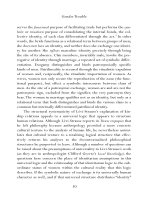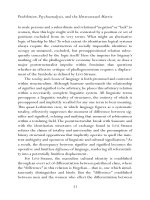GENDER TROUBLE 106
Bạn đang xem bản rút gọn của tài liệu. Xem và tải ngay bản đầy đủ của tài liệu tại đây (20.72 KB, 1 trang )
Prohibition, Psychoanalysis, and the Heterosexual Matrix
drama of “being” and “having” the Phallus as invariably phantasmatic.29
And yet, what determines the domain of the phantasmatic, the rules
that regulate the incommensurability of the Symbolic with the real? It is
clearly not enough to claim that this drama holds for Western, late capitalist household dwellers and that perhaps in some yet to be defined
epoch some other Symbolic regime will govern the language of sexual
ontology. By instituting the Symbolic as invariably phantasmatic, the
“invariably” wanders into an “inevitably,” generating a description of
sexuality in terms that promote cultural stasis as its result.
The rendition of Lacan that understands the prediscursive as an
impossibility promises a critique that conceptualizes the Law as prohibitive and generative at once.That the language of physiology or disposition does not appear here is welcome news, but binary
restrictions nevertheless still operate to frame and formulate sexuality
and delimit in advance the forms of its resistance to the “real.” In
marking off the very domain of what is subject to repression, exclusion operates prior to repression—that is, in the delimitation of the
Law and its objects of subordination. Although one can argue that for
Lacan repression creates the repressed through the prohibitive and
paternal law, that argument does not account for the pervasive nostalgia for the lost fullness of jouissance in his work. Indeed, the loss could
not be understood as loss unless the very irrecoverability of that pleasure did not designate a past that is barred from the present through
the prohibitive law. That we cannot know that past from the position
of the founded subject is not to say that that past does not reemerge
within that subject’s speech as fêlure, discontinuity, metonymic slippage. As the truer noumenal reality existed for Kant, the prejuridical
past of jouissance is unknowable from within spoken language; that
does not mean, however, that this past has no reality.The very inaccessibility of the past, indicated by metonymic slippage in contemporary
speech, confirms that original fullness as the ultimate reality.
The further question emerges:What plausibility can be given to an
account of the Symbolic that requires a conformity to the Law that
71









